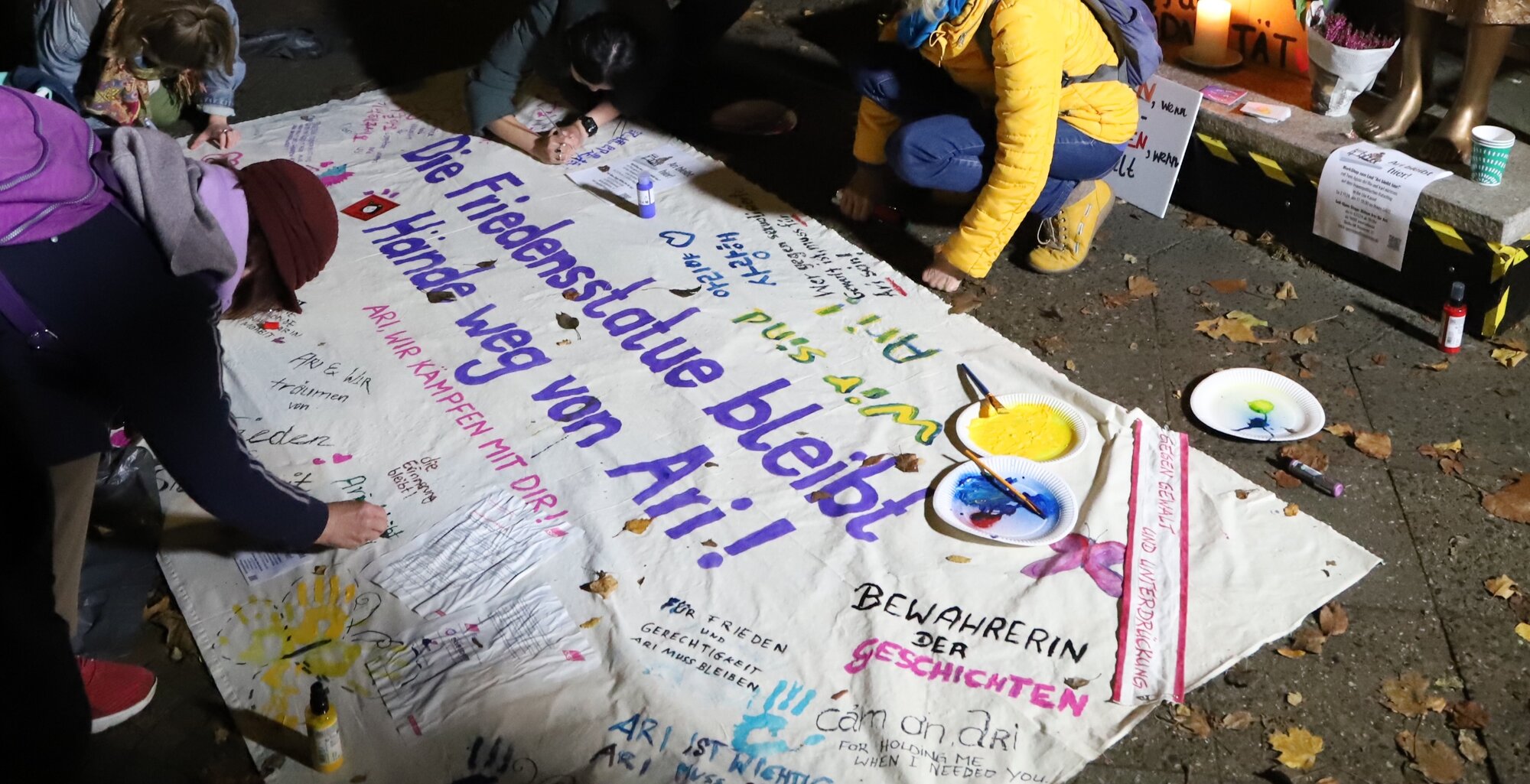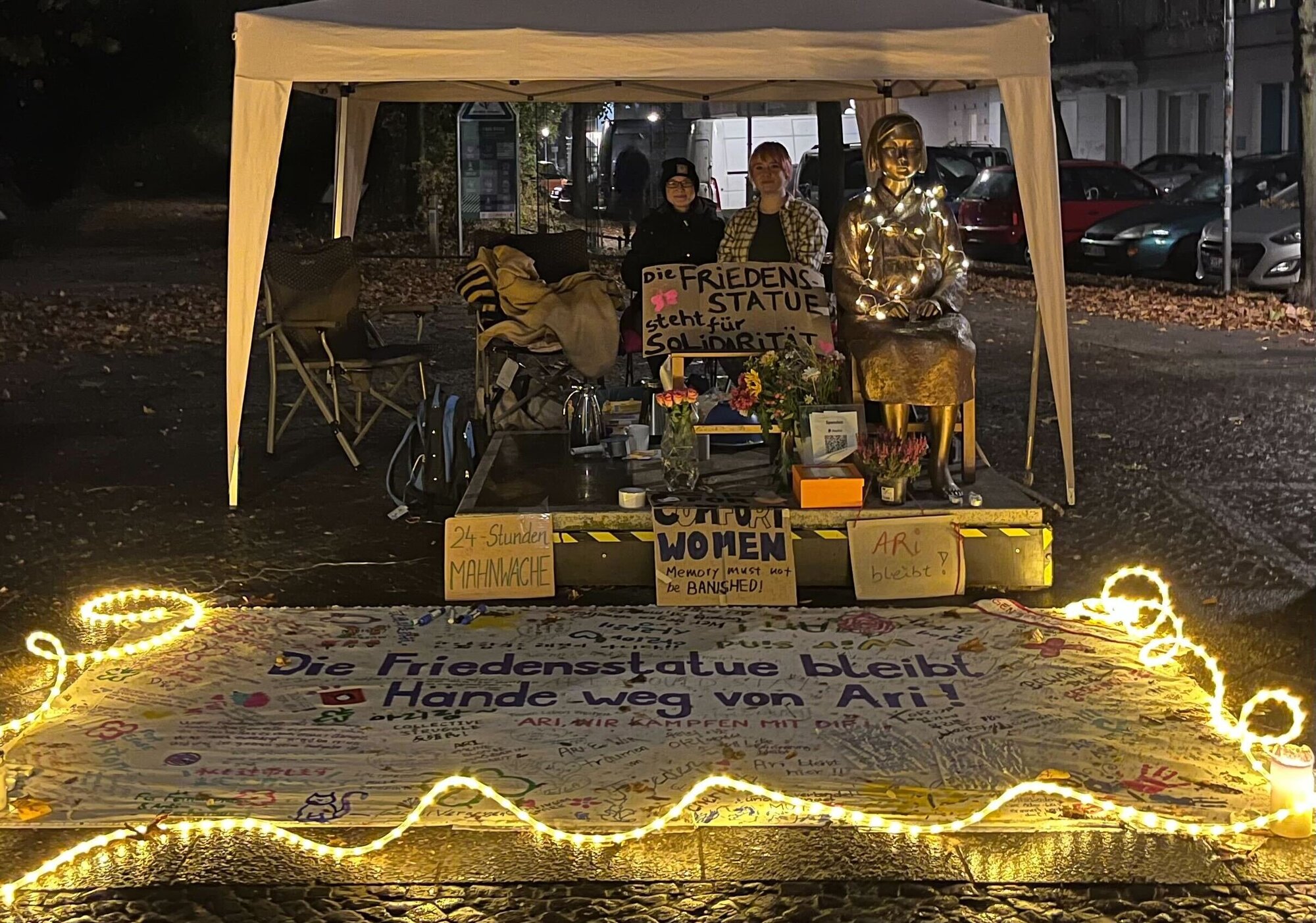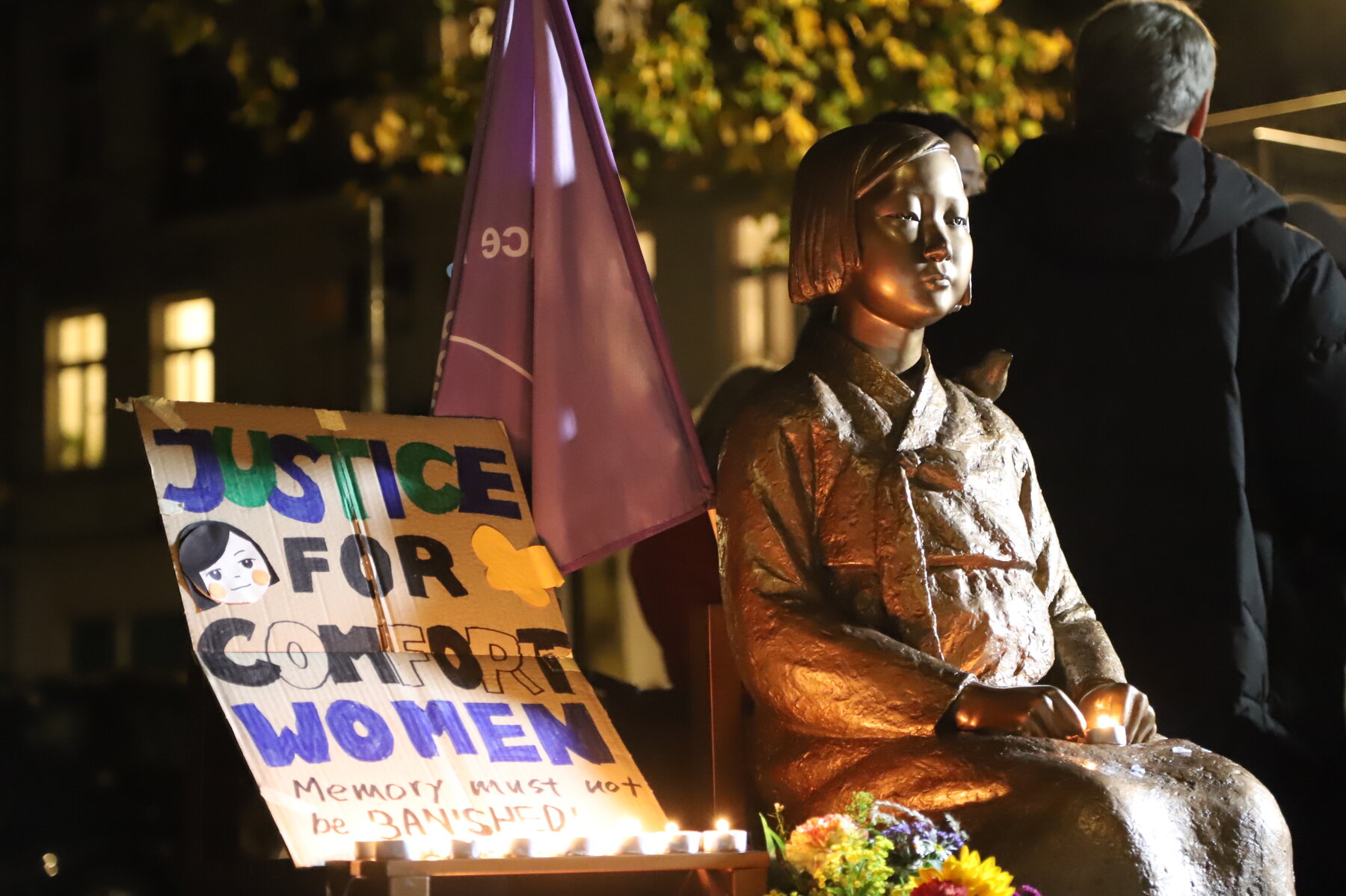“Ari reminds us of women who are too often forgotten.”
Residents in Berlin fight to keep a controversial statue of a young Korean girl that commemorates victims of sexual slavery.
It’s 3 am on an icy winter’s night in Berlin and local residents are milling around a floodlit statue of a girl on a chair with a bird on her shoulder. “My daughter loves to sit next to the statue and touch her cheek,” says a woman as her neighbours share tea and cake. It would feel like a party if it weren’t for the late hour and a banner reading, “The statue of peace stays. Keep your hands off Ari!” Instead, it’s a vigil for a statue which former Japanese prime minister Fumio Kishida had urged German chancellor Olaf Scholz to remove.
Over the past four years, the statue of a girl in traditional Korean dress has become the focus of diplomatic wrangling and local political conflict in Berlin. The organisation Korea Verband (Korea Association) erected the statue “Ari” in September 2020 to commemorate women from Japan’s occupational territories who were forced into sexual slavery by the Japanese army during World War II, a well-documented history which was denied by the Japanese government for decades.
The Korea Association put up the statue to educate the public about “comfort women’s” history and to create a place where citizens can meet and reflect on the often-overlooked issue of sexual violence. Following objections from Japan that the statue represents “a one-sided version of history,” the city district Berlin Mitte ordered it to be removed by the end of October 2024. “A statue which make a Japanese-Korean conflict the subject of discussion does not concern Germany nor does it fit into the memory culture of its capital,” argued the city district in their notice of removal. Korea Association has filed a lawsuit against the decision and, for now, Ari still stands.
“I feel a strong connection to Ari, not just because I can identify with her as a woman, but also because I am half-Korean, so she is a piece of home,” said Nina Kreutz, a member of the Korea Association. “While studying to become a teacher, I noticed that history is rarely approached from a global perspective. With our educational activities, we counter Eurocentrism and show different perspectives to which we as Berlin citizens are connected.”


Korea Association was founded in 1990 with the aim of supporting the Korean democracy movement from abroad. Today, it initiates cultural and educational activities in Berlin on several topics such as human rights and migration. The statue has hit a nerve in this young and international district of Moabit, a former industrial and working-class neighbourhood. On a street corner diagonally opposite Union Square, an abandoned, overgrown green area between residential buildings, Ari filled a vacuum and became part of a residents’ initiative to revive this public space.
Over 3,000 neighbours signed a residents’ application to keep Ari. Many people have become attached to her after events and educational activities in which they participated. Numerous local schools reach out for excursions. “Currently, we have a project for teenagers aged 13-18,” says Bianca Halliday, Nina’s colleague at Korea Association. “It’s difficult to approach a serious topic such as sexual violence, but if we want to end it, we have to teach about it.”
The city has suggested replacing Ari with a universal monument against sexual violence. But Bianca believes this would not spark the same engagement, “To address sexual violence, it is important to start with an actual event and actual victims, not some abstract concept.” Ari provides an “easy” entry point, sparking curiosity and compassion. “We start with visiting Ari, where the teenagers share their impressions. We explain Ari’s history as a ‘comfort woman’ and draw global connections. We teach, for instance, that the German military established brothels in World War II. We want pupils to critically reflect whether there is enough awareness of the history of sexual violence and also if it is properly addressed in today’s conflicts.” But the Association has come up against the obstacle of Germany’s diplomatic relations. In May 2024, Berlin’s Mayor Kai Wegner met Japanese Foreign Minister Yoko Kamikawa. Afterwards, Wegner criticized the “one-sided representation” of the statue, before highlighting the importance of Berlin’s and Tokyo’s city partnership.
The statue is part of a worldwide battle of remembrance. Ari has an identical twin in front of the Japanese embassy in Seoul. It’s the place where survivors of the “comfort women” system started their movement in 1993, demonstrating in front of the embassy and demanding an apology and reparations. Today, “comfort women” monuments have spread worldwide. The Japanese government ended a city partnership in 2018 over a similar monument in San Francisco.
“We wish that the government could see how valuable Ari and our educational activities are,” says Bianca. “Recently, the funding for one of our projects was rejected because Wegner asked for its discontinuation, based on his assumption that it would damage relations with Japan.” Nina adds that they are suppressing the voices of minority groups and their participation in public spaces. The Berlin Migration Council recently issued a statement saying that “Ari connects people from different networks across generations. She reminds us of the people who are all too often forgotten - which is also part of systematic sexualised violence: not believing (especially) girls and women and making their stories invisible.”

A short walk away, Korea Association has established a comfort women museum, where they also feature stories from partner organisations, such as experiences of women during the Yazidi genocide. “The monument is a place where people enjoy spending time. People affected by sexual violence feel safe and are encouraged here to talk about their experiences,” says Bianca. On this night, Ari’s fists are clenched, her feet float slightly above the ground and her face looks calm yet determined.
More cups of tea are poured and the conversations continue far past dawn as the sun rises behind residential buildings. “Ari can’t be removed just like that. We stand behind her, and we will protect both her and all the other women’s right to share their stories,” says Bianca.



